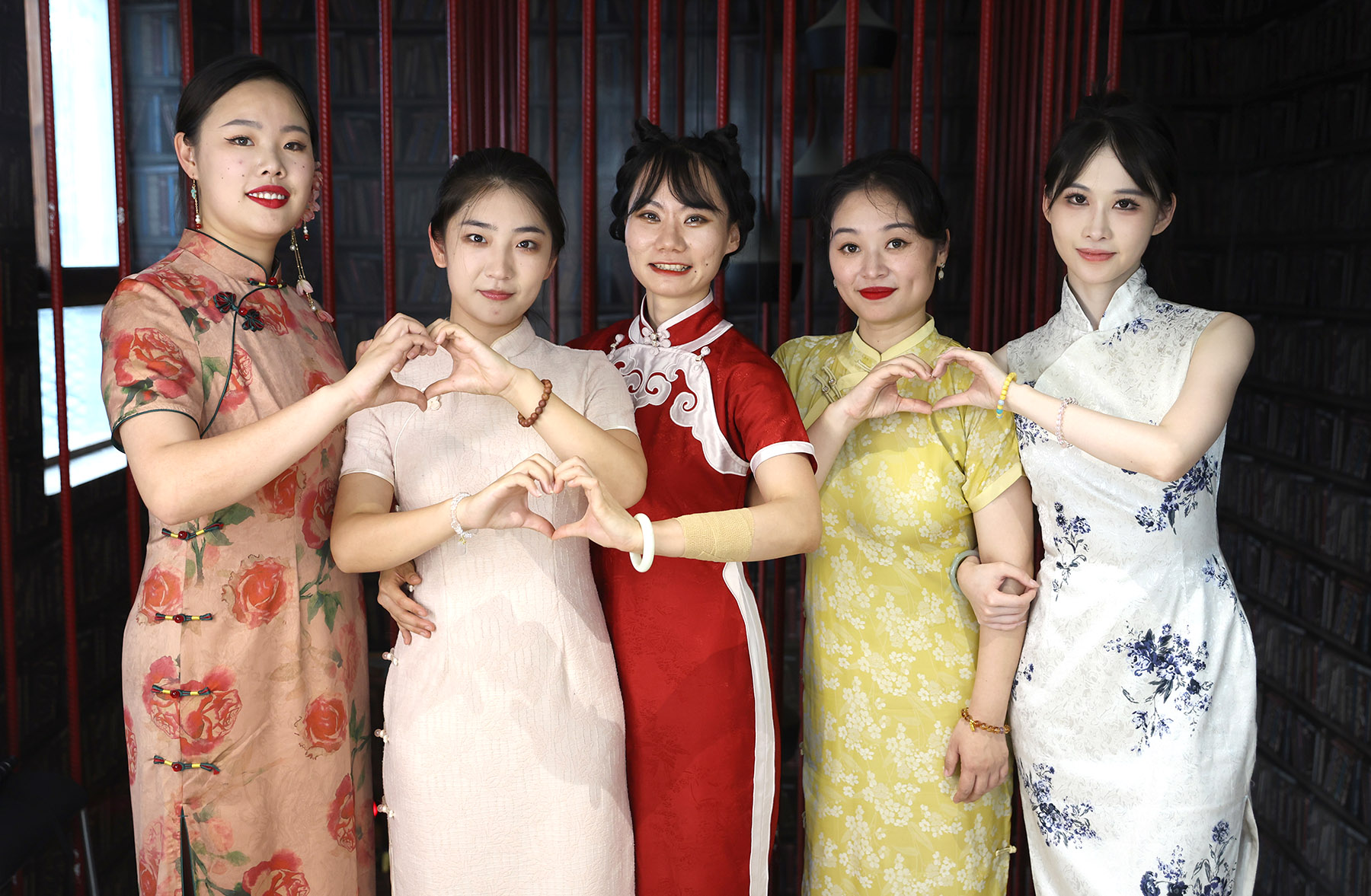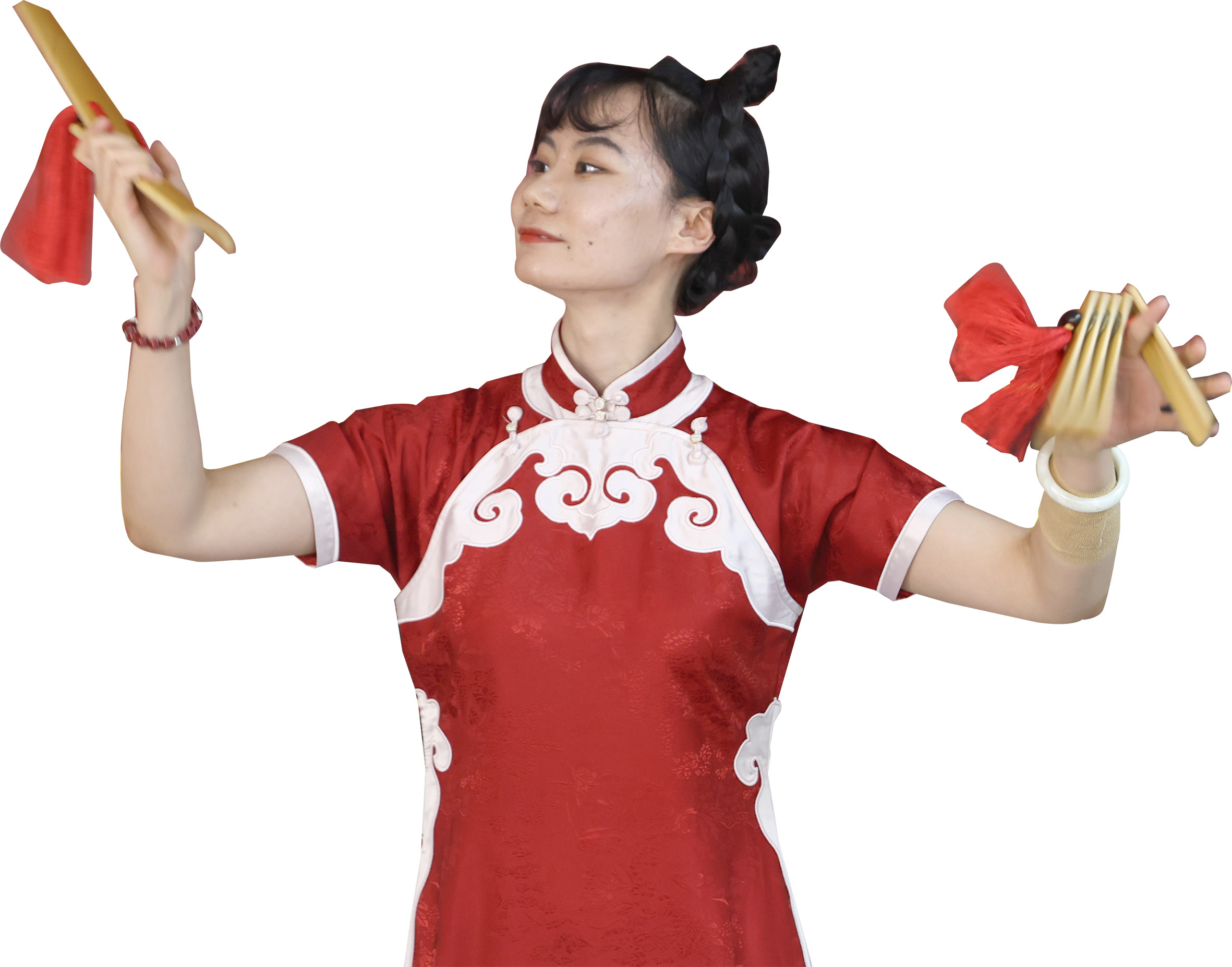High-energy, humorous, verbal art form is seeing a surge of female performers

At first, Shi Yun's parents couldn't understand why she would leave her well-paid job to start crosstalk — an art form consisting of rapid-fire jokes, clever wordplay and high energy.
A top graduate of the prestigious Huazhong University of Science and Technology with a degree in biotechnology, she had a high-paying job at an internet company in Hangzhou, Zhejiang province, when she plunged into a new career.
"Why leave a stable job for something like this?" Shi said, laughing as she recounted her parents' response. Her father couldn't even bring himself to tell his friends that his daughter had become a crosstalk artist, she said.
"He was embarrassed. It wasn't what he had imagined for me. But I knew this was my calling. I had to follow my heart, no matter how unconventional it seemed," said the 29-year-old.
But as she started sending photos from her shows and shared good reviews with them, their skepticism began to fade. Slowly, her parents came to realize that she was truly happy, and passionate about her new life.
READ MORE: The art of painting pictures with words
"Now, they see that I'm doing what I really love, and they've come to support me," she said. "That's all I ever wanted — to make them proud by being true to myself."
Shi is among a growing legion of women bucking tradition and taking part in crosstalk, or xiangsheng, a traditional form of Chinese comedic performance that typically involves dialogue between two performers.
Filled with wordplay, puns, cultural references, and sometimes social commentary, it first appeared in northern China during the Qing Dynasty (1644-1911). Traditionally, performers stand behind a wooden table wearing long robes, engaging in witty banter, though there are also solo acts and performances with more than two people.
Beginning as a form of street art, crosstalk became a way to entertain people by addressing family issues, troubled relationships, and social topics.
Fresh perspectives
Historically, crosstalk has been a male-dominated art form.
In traditional Chinese society, many forms of public performance — especially those based on humor and satire — were viewed as inappropriate for women.
"Comedy and wit were seen as tied to male identity, and women were expected to take on more 'feminine' roles," said 26-year-old Tang Jinzhu. "That's why men were often the natural fit for comic performances. But I don't agree with that."
Tang had trained to become an athlete before switching career paths about five years ago to become a crosstalk performer.
She believes female performers often stand out by offering a unique perspective that challenges gender norms, and they present fresh takes on topics that resonate with both men and women. Women in crosstalk today are not only gaining in visibility, but are also reshaping the art form, Tang said.
"By showcasing our wit, strong presence, and individuality, many female performers have carved out their own niche in this traditionally male-dominated world," she said.
Another crosstalk performer, Zhao Yuting, 23, said female performers have an advantage when it comes to topics that seem more authentic and relatable from a woman's perspective.
"For example, issues like the obsession with limited-edition lipsticks, awkward blind dates arranged by relatives, or the long queues at popular scenic spots — these topics are very well received by female audiences because we've lived through them," Zhao said. "The tone is often self-mocking, and the audience feels seen and validated."
Zhao became interested in crosstalk after watching shows on TV when she was a child. She made her debut in Beijing last summer, performing Kua Zhu Zhai, a classic crosstalk piece that highlights guan kou, a traditional technique that involves rapid-fire delivery of words without pauses.
The performer strings together words, sounds, and sometimes nonsensical syllables, creating a rhythm that's almost musical. The technique is known for its precision and the ability to engage the audience with speed and rhythm.
"I was so nervous my hands were trembling," Zhao recalled. "The piece I was performing was one of the first guan kou pieces I learned. I practiced it thousands of times. But when I was on stage, I couldn't finish it. The audience was very forgiving, though, and some young women in the front row even clapped for me when I forgot my lines. That helped me stay calm and continue."

Earning respect
Despite the differences between male and female crosstalk performers, both male and female artists dedicate themselves to mastering timing, delivery, and wordplay — essential skills for success in this art form.
Xu Hongyu, 32, another female performer, added that the training involves studying traditional scripts, refining verbal dexterity, and developing a personal style. She emphasized that persistence is the key to mastering crosstalk.
Xu, who made her stage debut in 2017, was introduced to crosstalk by her grandfather, a fan of the art form. Although she initially studied architecture, she chose to pursue crosstalk because it made her genuinely happy.
"I enjoy expressing myself on stage and connecting with the audience," said Xu.
However, there's still a lingering belief that women aren't as funny as men, especially in traditional art forms like crosstalk, she said. This bias sometimes leads to a lack of respect or acceptance from audiences, who may view female performers as less skilled.
Xu recalled one awkward experience when her performance received little laughter from the audience.
"But I'm a positive person," she said. "Overcoming criticism and societal expectations is part of the journey for both male and female performers. There are times when the audience doesn't laugh, but that's part of learning and growing as a performer."
Liu Yan, 23, who left a career in preschool education to become a crosstalk performer, shared a similar experience. "When I first performed, there were only four people in the audience. It was so quiet I almost cried. But I gave it my all, even though I didn't get the laughs I was hoping for."
Pioneering women
Despite these challenges, female crosstalk performers continue to break through the glass ceiling, gaining recognition and respect.
One of the most famous female crosstalk artists, Zhang Wenxia (1934-2018), made her name in Tianjin, a city known for its crosstalk fan base. Her student, Liu Chunhui, now 60, continues to inspire future generations.
Other notable figures include Jia Ling, a successful actress and director whose films Hi, Mom and Yolo topped the box office in China, and Zhao Yunyi, 28, the only female performer in De Yun She, who has gained widespread popularity on social media.
"They are not just female performers. They were pioneers — proving that the world of crosstalk could be as diverse and as dynamic as the women who dared to stand at its center," said crosstalk artist Gao Xiaopan, founder and owner of Hip-hop Crosstalk Club, a company based in Beijing that has been performing crosstalk since 2008.
"The best performers, regardless of gender, inject their own personality and creativity into their performances. They find new ways to approach traditional jokes, adapt their material for modern audiences, and experiment with different comedic styles and rhythms," he said.
This summer, Gao led a group of female crosstalk performers on a nationwide tour visiting cities including Beijing, Shenyang, Liaoning province and Handan, Hebei province. The shows highlight female crosstalk performers and have won acclaim from audiences.
"Given the prejudice and limited opportunities, many female crosstalk performers had to work significantly harder than their male counterparts to gain a spot on stage. They needed to prove their comedic chops, their ability to master the complexities of the art form, and their ability to command attention in a male-dominated industry," said Gao, 39.
"The dedication required to overcome these barriers makes their performances even more impactful, as they show audiences that comedy — especially crosstalk — is an art that transcends gender."

Shared dreams
Shi Yun's introduction to crosstalk was almost accidental.
After undergoing eye surgery, she was unable to use her phone for a month. To pass the time, her mother suggested she try listening to something with her eyes closed, and Shi was introduced to De Yun She, one of China's most famous crosstalk troupes.
Born in Hubei province, Shi had little to no exposure to the art form, which is popular in northern China. But as she listened to the energetic performances she was instantly hooked.
"It was so interesting. It made me laugh," she recalled.
"I had never really thought about crosstalk before. But after that, I couldn't stop listening. I was captivated by how effortlessly the performers could make a room laugh just with their words, their timing, and the energy between them."
Once her eye healed, she began attending live performances, Shi soon became a familiar face at shows and even earned a membership card that allowed her to attend for free.
Her involvement deepened when the organizers invited her to host a show, allowing her to interact more closely with the performers and the audience. It wasn't long before Shi began learning the craft, and she decided to take a year or more off to focus on her love of crosstalk.
Her passion for the art form grew as she dedicated herself to studying recordings, practicing relentlessly, and using methods from her student years, like repetition, to perfect her craft.
"I would listen to performances over and over again," she said. "It was like studying for a test. The more I listened, the more I understood. The nuances of timing, the pace, the pauses — everything clicked together like pieces of a puzzle."
As time passed, her performances gained recognition and positive feedback from audiences. The contrast between her former life and her new one made her feel both liberated and apprehensive about the future.
ALSO READ: Landmark gala show for impaired fans
Shi now regularly performs in a crosstalk troupe based in Hangzhou. She also tours nationwide, performing at venues across the country. Each show presents her with new challenges and opportunities for growth. The connection she feels with the audience, and the immediate feedback from their laughter, has become her fuel.
This summer, she's traveling with other female crosstalk performers from the Hip-hop Crosstalk Club. The club's mission is to take an innovative approach while respecting the traditions of the art form, and it has given Shi the platform to expand her reach as an artist.
What makes Shi most proud is that she's not only gaining recognition as a crosstalk performer but also paving the way for future generations of female artists in the field. Her success has become a source of inspiration for many women who dream of following in her footsteps.
"I receive a lot of messages on social media from women who want to become crosstalk performers," she said.
"They share their dreams with me, and we encourage each other. Female performers are increasingly taking the lead in their own shows, creating new material, and earning recognition for their contributions. This is inspiring future generations of women to enter the world of crosstalk, with more role models and opportunities now available," she said.
Contact the writer at chennan@chinadaily.com.cn


